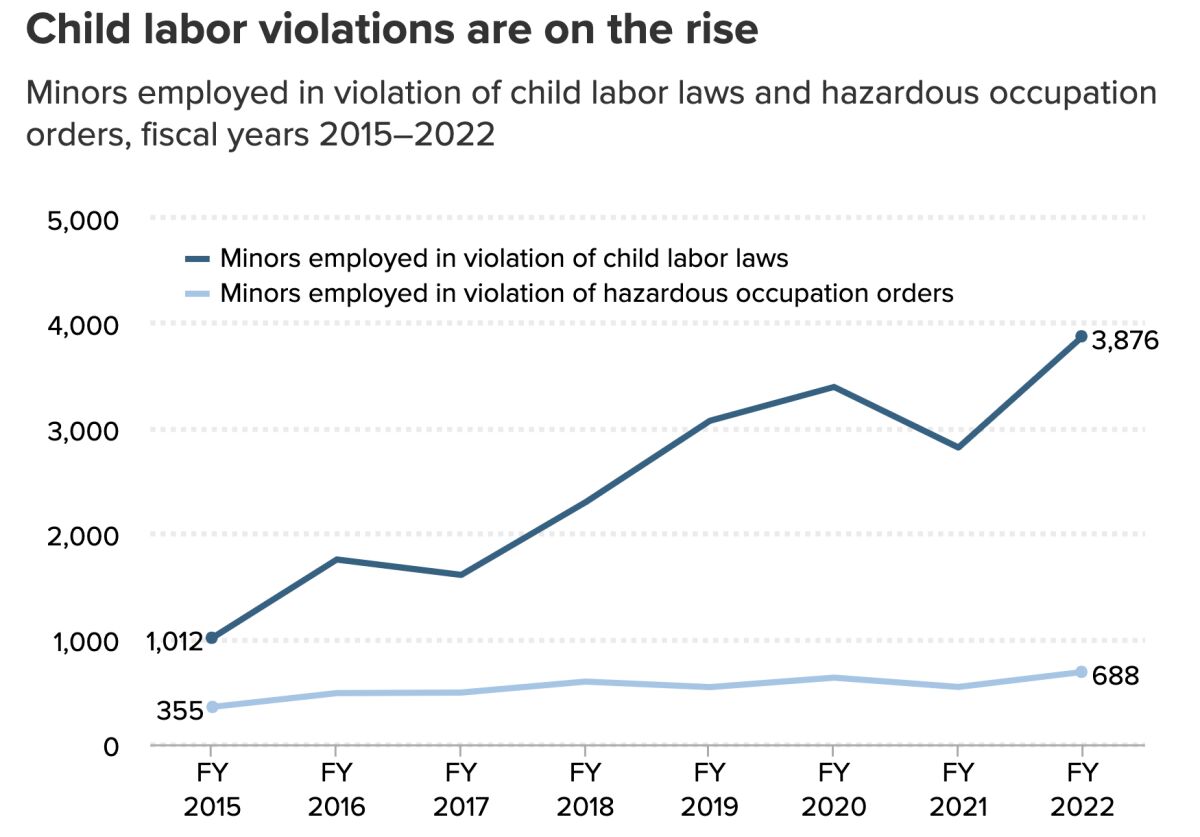Business
Column: The carnage from the rollback of child labor laws is just starting

If there is a predictable outcome from the rollback of child labor laws now taking place in red states nationwide, it’s that a flood of injured children is on the way. We are now standing on the edge of the water.
In just the last week, reports of horrific child deaths have come from Mississippi and Wisconsin. In the first case, a 16-year-old Guatemalan boy was killed at a poultry plant in Mississippi. In the second, a 16-year-old boy was killed when he got pinned in a wood-stacking machine at a sawmill.
What may be most horrifying about these accidents is that the work the children were doing is illegal under the laws of both states. But they happened amid a nationwide push by manufacturer and restaurant lobbies to liberalize child labor laws in those states and elsewhere.
With this legislation Iowa joins 20 other states in providing tailored, common sense labor provisions that allow young adults to develop their skills in the workforce. In Iowa, we understand there is dignity in work.
— Iowa Gov. Kim Reynolds, signing a rollback of child labor protections
In April, I reported on this campaign to bring back what Franklin Roosevelt labeled “this ancient atrocity.” Since then the movement has only advanced.
Child labor laws are among those most frequently flouted by businesses. The number of minors employed in violation of child labor laws in fiscal 2022 increased by 37.5% over the previous year, according to Department of Labor statistics. The number of minors employed in hazardous work in violation of state and federal laws increased by 26% in that period.
In the last fiscal year, the federal agency found 835 businesses violating child labor laws. Its fines and penalties averaged about $5,300 each. Do you think that’s stringent enough to dissuade would-be violators? Me neither.
What’s worse, “these numbers represent just a tiny fraction of violations, most of which go unreported and uninvestigated,” the labor-affiliated Economic Policy Institute observes.
If child labor laws already on the books can be flouted so easily, just imagine what will happen in states that have signaled that they don’t take their own laws seriously.
The prospect of carnage among child workers hasn’t put a dent in the campaign to make them more vulnerable to workplace injuries and death.
The rollbacks are often rationalized by conservative political leaders as promoting “parental rights.”
That’s the argument voiced by spokespeople for Republican Gov. Sarah Huckabee Sanders of Arkansas, who signed a law in March repealing a rule that required children under 16 to verify their age and obtain the written consent of a parent or guardian before obtaining a work certificate.
The Sanders administration defended the law by stating that “this permit was an arbitrary burden on parents to get permission from the government for their child to get a job.”
Another argument emphasizes the virtues of work for teens. On May 26, Republican Gov. Kim Reynolds of Iowa signed a pernicious law allowing 14- and 15-year-olds to work as many as six hours a day when schools are in session, to as late as 9 p.m. During school vacations, they could work as late as 11 p.m.
The measure also removes prohibitions against minors working in industrial laundries and in freezers and meat coolers.
More from photographer Lewis Hine: Child mine workers in Pennsylvania, 1911. The youngest was 14.
(National Archives)
“With this legislation Iowa joins 20 other states in providing tailored, common sense labor provisions that allow young adults to develop their skills in the workforce,” Reynolds said in signing the law. “In Iowa, we understand there is dignity in work.”
The Reynolds administration has been something of a one-stop shop for this kind hogwash that’s blind to the consequences of loosening child labor laws.
Last year, she signed a bill reducing the minimum age to 16 from 18 for workers providing child care for 3- and 2-year-olds without adult supervision. The law also raised the maximum number of toddlers that could be left under the care of adolescents without adult oversight — to seven 2-year-olds (up from six) or 10 3-year-olds (up from eight).
The new Iowa law also allows teens as young as 16 to serve alcohol in restaurants, as long as two adults are present and the young workers have been given “training on prevention and response to sexual harassment.”
At least that provision recognizes some of the dangers in allowing teenagers to serve alcohol. Iowa has joined six other states in lowering the age for serving alcohol. Three more have such proposals in the legislative hopper.
What’s the big deal with allowing teens to serve alcohol? “Numerous studies have found that underage servers are more likely to sell alcohol to underage buyers,” reports Nina Mast of the Economic Policy Institute. “In general, greater access to alcohol is associated with higher rates of underage consumption. Permitting younger workers to serve alcohol will provide underage youth — both workers and customers — with increased proximity to direct and indirect alcohol-related harms that are especially acute for young people.”
Bars and restaurants where alcohol is served are already known for high rates of sexual harassment — these new laws will expose workers to these abuses at an age where their ability to fend them off is low, as is their access to legal redress. That’s not a concern for the promoters of the new laws and regulations, such as restaurant lobbyists, who drafted the new Iowa law.

Violations of federal child labor laws have soared, even as numerous red states roll back their own laws restricting child employment.
(Economic Policy Institute)
The restaurant lobbyists had plenty of help from conservative and libertarian ideologues. Consider Jeffrey Tucker, who may be best known for promoting the egregious Great Barrington Declaration, a manifesto that discouraged vaccination and social distancing measures against the COVID-19 pandemic in favor of allowing the disease to virtually run rampant among Americans in the fruitless quest for “herd immunity.”
The declaration, which contributed to the toll of more than 1.1 million COVID deaths in the U.S., was embraced by politicians such as Republican Gov. Ron DeSantis of Florida, who was desperate to establish his right-wing bona fides for a race for the presidency. His state has notched one of the worst death rates in the country from the disease.
Tucker’s libertarian worldview glorifies child labor. In a 2016 article titled “Let the kids work,” Tucker ridiculed the Washington Post for publishing a gallery of work by the great photographer Lewis Hine of child laborers from 100 years ago, including miners and sweatshop workers as young as 10.
Tucker wrote that those children were “working in the adult world, surrounded by cool bustling things and new technology. They are on the streets, in the factories, in the mines, with adults and with peers, learning and doing. They are being valued for what they do, which is to say being valued as people…. Whatever else you want to say about this, it’s an exciting life.”
What we want to say is: It’s a deadly life.
The only bulwark against the loosening of state child labor laws is federal law, which preempts state statutes that are less restrictive than the federal statute. The Department of Labor has already said that Iowa’s law violates the child labor provisions of the Fair Labor Standards Act of 1938, though it hasn’t yet taken legal action.
The federal provisions could be strengthened even more by ratification of the Child Labor Amendment, a proposed constitutional amendment that was passed overwhelmingly by Congress in 1924. The measure was ratified by what was then a majority of 25 states by 1935; the total reached 28 by 1937, after which the movement stalled. (The first state to ratify the amendment, interestingly, was Arkansas; California was the second.)
The amendment makes explicit the right of Congress to “limit, regulate, and prohibit” labor by anyone under 18. It was a response to rulings by a conservative Supreme Court in 1918 and 1922 overturning federal child labor laws.
There’s no deadline for final ratification of the amendment, which needs 10 more states to sign on. Ratification has been rejected by 15 states, but that’s not binding. Those states include several currently under complete or partial Democratic Party leadership: Connecticut, Delaware, Maryland, Massachusetts, North Carolina and Vermont. Five others never took a vote — New York, Rhode Island, Nebraska, Mississippi and Alabama. With a slight shift in the political winds, then, ratification could be within reach.
That could happen if more voters become aware of the scourge of child labor. Let’s hope that it doesn’t take any more deaths and injuries among child workers to bring reality home.

Business
Elon Musk, Mark Zuckerberg and Jeff Bezos to Attend Trump’s Inauguration

Bezos, Zuckerberg and Coke at the inauguration
Corporate America had already raced to donate big sums to Donald Trump’s record-breaking inaugural fund. Now some of its leaders appear eager to jockey for prominent positions at the inauguration next week.
It’s a new reminder that for some of the nation’s biggest businesses, forging close ties to a president-elect who is promising hard-hitting policies like tariffs is a priority this time around.
Jeff Bezos and Mark Zuckerberg are expected to be on the inauguration dais, according to NBC News, alongside Elon Musk and several cabinet picks.
The presence of Musk isn’t a surprise, given the Tesla chief’s significant support of and huge influence over Trump. But the other tech moguls have only more recently been seen as supporters of the administration. (Indeed, Bezos frequently sparred with Trump during his first presidential term.)
It’s the latest effort by Bezos and Zuckerberg to burnish their Trump credentials. At the DealBook Summit in December, Bezos — whose Amazon has faced scrutiny under the Biden administration and whose Blue Origin is hoping to win government rocket contracts — said that he was “very hopeful” about Trump’s efforts to reduce regulation.
And Zuckerberg recently announced significant changes to Meta’s content moderation policy, including relaxing restrictions on speech seen as protecting groups including L.G.B.T.Q. people that won praise from Trump and other conservatives. On the inauguration front, Zuckerberg is also co-hosting a reception alongside the longtime Trump backers Miriam Adelson, Tilman Fertitta and Todd Ricketts.
Both tech moguls have visited Mar-a-Lago since the election, with Zuckerberg having done so more than once.
Coca-Cola took a different tack. The drinks giant’s C.E.O., James Quincey, gave Trump what an aide called the “first ever Presidential Commemorative Inaugural Diet Coke bottle.”
More broadly, business leaders want a piece of the inauguration action. The Times previously reported that the Trump inaugural fund had surpassed $170 million, a record, and that even major donors have been wait-listed for events.
Others are throwing unofficial events around Washington, including an “Inaugural Crypto Ball” that will feature Snoop Dogg, with tickets starting at $5,000, The Wall Street Journal reports.
It’s a reminder that C.E.O.s are reading the room, and preparing their companies for a president who has proposed creating an “External Revenue Service” to oversee what he has promised will be wide-ranging tariffs.
David Urban, a longtime Trump adviser who’s hosting a pre-inauguration event, told The Journal, “This is the world order, and if we’re going to succeed, we need to get with the world order.”
-
In other Trump news: The president-elect is expected to appear via videoconference at the World Economic Forum in Davos, Switzerland, which starts on Inauguration Day, according to Semafor.
HERE’S WHAT’S HAPPENING
Investors brace for the latest inflation data. The Consumer Price Index report, due out at 8:30 a.m. Eastern, is expected to show that inflation ticked up last month, most likely because of climbing food and fuel costs. Global bond markets have been rattled as slow progress on slowing inflation has prompted the Fed to slash its forecast for interest rate cuts.
More Trump cabinet picks will appear before the Senate on Wednesday. Senator Marco Rubio of Florida, the choice for secretary of state, is expected to field questions about his views on the Middle East, Ukraine and China, but is expected to be confirmed. Russell Vought, the pick to run the Office of Management and Budget, will most likely be asked about his advocacy for drastically shrinking the federal government, a key Trump objective. And Sean Duffy, the Fox Business host chosen to lead the Transportation Department, will probably face questions on how he would oversee matters including aviation safety and autonomous vehicles, the latter of which is a priority for Elon Musk.
Meta plans to lay off another 5 percent of its employees. Mark Zuckerberg, the tech giant’s C.E.O., told staff members to prepare for “extensive performance-based cuts” as the company braces for “an intense year.” The social media giant faces intense competition in the race to commercialize artificial intelligence.
A new bill would give TikTok a reprieve from a ban in the United States. Senator Ed Markey, Democrat of Massachusetts, said he planned to introduce the Extend the TikTok Deadline Act, which would give the video platform 270 additional days to be divested from its Chinese parent, ByteDance before being blacklisted. It’s the latest effort to buy TikTok time, as the app faces a Jan. 19 deadline set by a law; President-elect Donald Trump has opposed the potential ban as well.
A question of succession
JPMorgan Chase and BlackRock, the giant money manager, just reported earnings. (In short: Both handily beat analyst expectations.)
But the Wall Street giants are likely to face questioning on a particular issue on Wednesday: Which top lieutenants are in line to replace their larger-than-life C.E.O.s, Jamie Dimon and Larry Fink.
Who’s out:
-
Daniel Pinto, who had long been Dimon’s right-hand man, said he would officially drop his responsibilities as JPMorgan’s C.O.O. in June and retire at the end of 2026. Jenn Piepszak, the co-C.E.O. of the company’s core commercial and investment bank, has become C.O.O.
-
And Mark Wiedman, the head of BlackRock’s global client business and a top contender to succeed Fink, is planning to leave, according to news reports.
What Wall Street is gossiping about JPMorgan: Even in taking the C.O.O. role, JPMorgan said that Piepszak wasn’t interested in succeeding Dimon “at this time.” DealBook hears that while she genuinely appears not to want to pursue the top job, the phrasing covers her in case she changes her mind.
For now, that means the most likely candidates for the top spot are Marianne Lake, the company’s head of consumer and community banking; Troy Rohrbaugh, the other co-head of the commercial and investment bank; and Doug Petno, a co-head of global banking.
The buzz around BlackRock: Wiedman reportedly didn’t want to keep waiting to succeed Fink and is expected to seek a C.E.O. position elsewhere. (So sudden was his departure that he’s forfeiting about $8 million worth of stock options and, according to The Wall Street Journal, he doesn’t have another job lined up yet.)
Fink said on CNBC on Wednesday that Wiedman’s departure had been in the works for some time, with the executive having expressed a desire to leave about six months ago.
Other candidates to take over for Fink include Martin Small, BlackRock’s C.F.O.; Rob Goldstein, the firm’s C.O.O.; and Rachel Lord, the head of international.
But Dimon and Fink aren’t going anywhere just yet. Dimon, 68, said only last year that he might not be in the role in five years. And Fink, 72, said in July that he was working on succession planning: “When I do believe the next generation is ready, I’m out.”
The S.E.C. gets in a final shot at Musk
Another battle between Elon Musk and the S.E.C. erupted on Tuesday, with the agency suing the tech mogul over his 2022 purchase of Twitter.
It’s unclear what happens to the lawsuit once President-elect Donald Trump, who counts Musk as a close ally, takes office. But the agency’s reputation as an independent watchdog may be at stake.
A recap: The S.E.C. accused Musk of violating securities laws in his $44 billion acquisition of the social media company.
The agency said that Musk had failed to disclose his Twitter ownership stake for a pivotal 11-day stretch before revealing his intentions to purchase the company. That breach allowed him to buy up at least $150 million worth of Twitter shares at a lower price — to the detriment of existing shareholders, the agency argues.
The S.E.C. isn’t just seeking to fine Musk. It wants him to pay back the windfall. “That’s unusual,” Ann Lipton, a professor at Tulane Law School, told DealBook.
Alex Spiro, Musk’s lawyer, called the latest action a “sham” and accused the agency of waging a “multiyear campaign of harassment” against him.
The showdown sets up a tough question for the S.E.C. Will Paul Atkins, the president-elect’s widely respected pick to lead the agency, drop the case? Such a move could call the bedrock principle of S.E.C. independence into question.
Jay Clayton, who led the agency during Trump’s first term, earned the respect of the business community for running it in a largely drama-free manner. It was under Clayton that the S.E.C. sued Musk over his statements about taking Tesla private.
Musk, who is set to become Trump’s cost-cutting czar and is expected to have office space in the White House complex, has called for the “comprehensive overhaul” of agencies like the S.E.C. The billionaire said he would also like to see “punitive action against those individuals who have abused their regulatory power for personal and political gain.”
-
In related news: The Consumer Financial Protection Bureau sued Capital One, accusing it of cheating its depositors out of $2 billion in interest payments.
THE SPEED READ
Deals
-
DAZN, the streaming network backed by the billionaire businessman Len Blavatnik, is closing in on funding from Saudi Arabia’s sovereign wealth fund as the kingdom continues to expand its sports footprint. (NYT)
-
The Justice Department sued KKR, accusing the investment giant of withholding information during government reviews for several of its deals. KKR filed a countersuit. (Bloomberg)
-
OpenAI added Adebayo Ogunlesi, the billionaire co-founder of the infrastructure investment firm Global Infrastructure Partners, to its board. (FT)
Politics and policy
Best of the rest
We’d like your feedback! Please email thoughts and suggestions to dealbook@nytimes.com.
Business
For uninsured fire victims, the Small Business Administration offers a rare lifeline

As wildfires continue to burn around Southern California, thousands of business owners, homeowners and renters are confronting the daunting challenge of rebuilding from the ashes. For some number of them, the road ahead will be all the more difficult because they didn’t have any or enough insurance to cover their losses. For them, the U.S. Small Business Administration is a possible lifeline.
The SBA, which offers emergency loans to businesses, homeowners, renters and nonprofits, is among the few relief options for those who don’t have insurance or are underinsured. Uninsured Angelenos can also apply for disaster assistance through the Federal Emergency Management Agency, or FEMA.
The current wildfires are ravaging a state that was already in the midst of a home insurance crisis. Thousands of homeowners have lost their insurance in recent years as providers pull out of fire-prone areas and jack up their prices in the face of rising risk.
“For those who are not going to get that insurance payout, this is available,” Small Business Administration head Isabella Casillas Guzman said in an interview during a recent trip to the fire areas. “The loans are intended to fill gaps, and that is very broad.”
About one-third of businesses don’t have insurance and three-quarters are underinsured, Guzman said.
“There will be residual effects around the whole community,” she said. “Insurance will not cover this disaster.”
Businesses, nonprofits and small agricultural cooperatives can apply for an economic injury loan or a physical damage loan through SBA. Homeowners are eligible for physical damage loans. Economic injury loans are intended to help businesses meet ordinary financial demands, while physical damage loans provide funds for repairs and restoration. People can apply online and loans must be repaid within 30 years.
Renters can receive up to $100,000 in assistance, homeowners up to $500,000 and businesses up to $2 million, according to Guzman. Homeowners and renters who cannot get access to credit elsewhere can qualify for loans with a interest rate of 2.5%. The SBA determines an applicant has no credit available elsewhere if they do not have other funds to pay for disaster recovery and cannot borrow from nongovernment sources.
Interest rates for homeowners and renters who do have access to credit elsewhere are just over 5%. Loans for businesses could come with interest rates of 4% or 8% depending on whether the business has other credit options.
An applicant must show they are able to repay their loan and have a credit history acceptable to the SBA in order to be approved. The loans became available following President Biden’s declaration of a major disaster in California.
“We’ve already received hundreds of applications from individuals and businesses interested in exploring additional support,” Guzman said. “We know the economic disruption may not be contained to the footprint of any evacuation zones or power outages.”
People who don’t have insurance or whose insurance doesn’t cover the entirety of their losses are eligible for loans, Guzman said. While many will use the funds to start from scratch after losing their property to the fires, businesses that are still standing can also apply for support to cover lost revenue.
Guzman was not able to estimate the total value of loans they expect to offer in California but said the organization is on solid financial footing after temporarily running out of funds in October.
“Funding has been replenished by Congress, and we expect to be able to coordinate closely with Congress,” Guzman said. “We’re fully funded and in a good position to provide support.”
Business
Cookies, Cocktails and Mushrooms on the Menu as Justices Hear Bank Fraud Case

In a lively Supreme Court argument on Tuesday that included references to cookies, cocktails and toxic mushrooms, the justices tried to find the line between misleading statements and outright lies in the case of a Chicago politician convicted of making false statements to bank regulators.
The case concerned Patrick Daley Thompson, a former Chicago alderman who is the grandson of one former mayor, Richard J. Daley, and the nephew of another, Richard M. Daley. He conceded that he had misled the regulators but said his statements fell short of the outright falsehoods he said were required to make them criminal.
The justices peppered the lawyers with colorful questions that tried to tease out the difference between false and misleading statements.
Chief Justice John G. Roberts Jr. asked whether a motorist pulled over on suspicion of driving while impaired said something false by stating that he had had one cocktail while omitting that he had also drunk four glasses of wine.
Caroline A. Flynn, a lawyer for the federal government, said that a jury could find the statement to be false because “the officer was asking for a complete account of how much the person had had to drink.”
Justice Ketanji Brown Jackson asked about a child who admitted to eating three cookies when she had consumed 10.
Ms. Flynn said context mattered.
“If the mom had said, ‘Did you eat all the cookies,’ or ‘how many cookies did you eat,’ and the child says, ‘I ate three cookies’ when she ate 10, that’s a false statement,” Ms. Flynn said. “But, if the mom says, ‘Did you eat any cookies,’ and the child says three, that’s not an understatement in response to a specific numerical inquiry.”
Justice Sonia Sotomayor asked whether it was false to label toxic mushrooms as “a hundred percent natural.” Ms. Flynn did not give a direct response.
The case before the court, Thompson v. United States, No. 23-1095, started when Mr. Thompson took out three loans from Washington Federal Bank for Savings between 2011 and 2014. He used the first, for $110,000, to finance a law firm. He used the next loan, for $20,000, to pay a tax bill. He used the third, for $89,000, to repay a debt to another bank.
He made a single payment on the loans, for $390 in 2012. The bank, which did not press him for further payments, went under in 2017.
When the Federal Deposit Insurance Corporation and a loan servicer it had hired sought repayment of the loans plus interest, amounting to about $270,000, Mr. Thompson told them he had borrowed $110,000, which was true in a narrow sense but incomplete.
After negotiations, Mr. Thompson in 2018 paid back the principal but not the interest. More than two years later, federal prosecutors charged him with violating a law making it a crime to give “any false statement or report” to influence the F.D.I.C.
He was convicted and ordered to repay the interest, amounting to about $50,000. He served four months in prison.
Chris C. Gair, a lawyer for Mr. Thompson, said his client’s statements were accurate in context, an assertion that met with skepticism. Justice Elena Kagan noted that the jury had found the statements were false and that a ruling in Mr. Thompson’s favor would require a court to rule that no reasonable juror could have come to that conclusion.
Justices Neil M. Gorsuch and Brett M. Kavanaugh said that issue was not before the court, which had agreed to decide the legal question of whether the federal law, as a general matter, covered misleading statements. Lower courts, they said, could decide whether Mr. Thompson had been properly convicted.
Justice Samuel A. Alito Jr. asked for an example of a misleading statement that was not false. Mr. Gair, who was presenting his first Supreme Court argument, responded by talking about himself.
“If I go back and change my website and say ‘40 years of litigation experience’ and then in bold caps say ‘Supreme Court advocate,’” he said, “that would be, after today, a true statement. It would be misleading to anybody who was thinking about whether to hire me.”
Justice Alito said such a statement was, at most, mildly misleading. But Justice Kagan was impressed.
“Well, it is, though, the humblest answer I’ve ever heard from the Supreme Court podium,” she said, to laughter. “So good show on that one.”
-

 Health1 week ago
Health1 week agoOzempic ‘microdosing’ is the new weight-loss trend: Should you try it?
-
/cdn.vox-cdn.com/uploads/chorus_asset/file/25822586/STK169_ZUCKERBERG_MAGA_STKS491_CVIRGINIA_A.jpg)
/cdn.vox-cdn.com/uploads/chorus_asset/file/25822586/STK169_ZUCKERBERG_MAGA_STKS491_CVIRGINIA_A.jpg) Technology6 days ago
Technology6 days agoMeta is highlighting a splintering global approach to online speech
-

 Science4 days ago
Science4 days agoMetro will offer free rides in L.A. through Sunday due to fires
-
/cdn.vox-cdn.com/uploads/chorus_asset/file/25821992/videoframe_720397.png)
/cdn.vox-cdn.com/uploads/chorus_asset/file/25821992/videoframe_720397.png) Technology1 week ago
Technology1 week agoLas Vegas police release ChatGPT logs from the suspect in the Cybertruck explosion
-

 Movie Reviews1 week ago
Movie Reviews1 week ago‘How to Make Millions Before Grandma Dies’ Review: Thai Oscar Entry Is a Disarmingly Sentimental Tear-Jerker
-

 Health1 week ago
Health1 week agoMichael J. Fox honored with Presidential Medal of Freedom for Parkinson’s research efforts
-

 Movie Reviews1 week ago
Movie Reviews1 week agoMovie Review: Millennials try to buy-in or opt-out of the “American Meltdown”
-

 News1 week ago
News1 week agoPhotos: Pacific Palisades Wildfire Engulfs Homes in an L.A. Neighborhood















